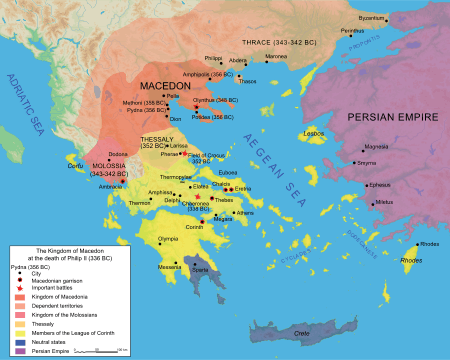League of Corinth

The League of Corinth, also referred to sometimes as the Hellenic League (from Greek Ἑλληνικός Hellenikos, "pertaining to Greece and Greeks"[1]), was a federation of Greek states created by Philip II of Macedon during the winter of 338 BC/337 BC after the Battle of Chaeronea, to facilitate his use of military forces in his war against Persia. The name 'League of Corinth' was invented by modern historians due to the first council of the League being in Corinth. It was the first time in history that most of the Greek states (with the notable exception of Sparta) managed to become part of a single political entity.[2]
Organization
The League was governed by the Hegemon (strategos autokrator in a military context),[3] the Synedrion (council) and the Dikastai (judges). Decrees of the league were issued in Corinth, Athens, Delphi, Olympia and Pydna.[4] The League maintained an army levied from member states in approximate proportion to their size, while Philip established garrisons (commanded by phrourarchs, or garrison commanders) in Corinth, Thebes, and Ambracia.
Treaty of the Common Peace
(A fragmentary inscription found in Athens)[5][6]
Text
| “ | [․․․․․․․․․21․․․․․․․․․․ Ποσ]ειδῶ ․․5․․
․․․․․․․․․․22․․․․․․․․․․ς ἐμμεν[ῶ ․․․․] ․․․․․․․․․․22․․․․․․․․․․νον[τ]ας τ․․․․ [․․․․․․․․18․․․․․․․․ οὐδ]ὲ ὅπλα ἐ[π]οί[σω ἐ]- [πὶ πημονῆι ἐπ’ οὐδένα τῶν] ἐμμενόντ[ω]ν ἐν τ- [οῖς ὅρκοις οὔτε κατὰ γῆν] οὔτε κατὰ [θ]άλασ- [σαν· οὐδὲ πόλιν οὐδὲ φρο]ύριον καταλήψομ- [αι οὔτε λιμένα ἐπὶ πολέ]μωι οὐθενὸς τῶν τ- [ῆς εἰρήνης κοινωνούντ]ων τέχνηι οὐδεμι- [ᾶι οὔτε μηχανῆι· οὐδὲ τ]ὴν βασιλείαν [τ]ὴν Φ- [ιλίππου καὶ τῶν ἐκγόν]ων καταλύσω ὀδὲ τὰ- [ς πολιτείας τὰς οὔσας] παρ’ ἑκάστοις ὅτε τ- [οὺς ὅρκους τοὺς περὶ τ]ῆς εἰρήνης ὤμνυον· [οὐδὲ ποιήσω οὐδὲν ἐνα]ντίον ταῖσδε ταῖς [σπονδαῖς οὔτ’ ἐγὼ οὔτ’ ἄλ]λωι ἐπιτρέψω εἰς [δύναμιν, ἀλλ’ ἐάν τις ποε̑ι τι] παράσπονδ[ον] πε- [ρὶ τὰς συνθήκας, βοηθήσω] καθότι ἂν παραγ- [γέλλωσιν οἱ ἀεὶ δεόμενοι] καὶ πολεμήσω τῶ- [ι τὴν κοινὴν εἰρήνην παρ]αβαίνοντι καθότι [ἂν ἦι συντεταγμένον ἐμαυ]τῶι καὶ ὁ ἡγε[μὼ]- [ν κελεύηι ․․․․․12․․․․․ κα]ταλείψω τε․․ — — — — — — — — — — — — — ∶𐅃 [— — — — — — — — — — ∶ Θεσ]σαλῶν ∶Δ [— — — — — — — — — — — ῶ]ν ∶ΙΙ [— — — — — — — — — Ἐλειμ]ιωτῶν ∶Ι [— — — — Σαμοθράικων καὶ] Θασίων ∶ΙΙ — — — — — — — — — ων ∶ΙΙ∶ Ἀμβρακιωτ[ῶν] [— — — — — — — ἀ]πὸ Θράικης καὶ [— — — — — ∶] Φωκέων ∶ΙΙΙ∶ Λοκρῶν ∶ΙΙΙ [— — — — Οἰτ]αίων καὶ Μαλιέων καὶ [Αἰνιάνων ∶ΙΙΙ∶ — καὶ Ἀγ]ραίων καὶ Δολόπων ∶𐅃 [— — — — — — ∶ Πε]ρραιβῶν ∶ΙΙ [— — — — — ∶ Ζακύνθο]υ καὶ Κεφαληνίας ∶ΙΙΙ |
” |
Translation
| “ | Oath. I swear by Zeus, Gaia, Helios, Poseidon and all the gods and goddesses. I will abide by the common peace and I will neither break the agreement with Philip, nor take up arms on land or sea, harming any of those abiding by the oaths. Nor shall I take any city, or fortress, nor harbour by craft or contrivance, with intent of war against the participants of the war. Nor shall I depose the kingship of Philip or his descendants, nor the constitutions existing in each state, when they swore the oaths of the peace. Nor shall I do anything contrary to these agreements, nor shall I allow anyone else as far as possible. But if anyone does commit any breach of the treaty, I shall go in support as called by those who need and I shall fight the transgressors of the common peace, as decided (by the council) and called on by the hegemon and I shall not abandon--------
of Thessalians--Elimiotes--Samothracians and Thasians---Ambraciots---from Thrace and---Phocians, Locrians Oitaeans and Malians and Ainianes --and Agraeans and Dolopes---Perrhaebi---Zacynthus and Cephalenia. |
” |
The League during the Alexandrian campaigns
The decision for the Destruction of Thebes as transgressor of the above oath was taken by the council of the League of Corinth by a large majority.[7] The League is mentioned by Arrian (I, 16, 7), after the battle of Granicus (334 BC). Alexander sent 300 panoplies to the temple of Pallas Athena in Athens, with the following inscription.
| “ | Alexander, son of Philip, and the Hellenes, except the Lacedaemonians, from the barbarians inhabiting Asia[8] | ” |
During 331 BC after the battle of Megalopolis, Sparta was forced to join the League of Corinth.[9] During the Asiatic campaign, Antipater was appointed deputy hegemon of the League.[10]
Aftermath
The League was dissolved after the Lamian War (322 BC).[11] During 302 BC King Antigonus of Macedon and his son Demetrius Poliorcetes tried to revive the federation against Cassander. Antigonus III Doson (king of Macedon from 229 BC to 221 BC) also revived the League against Sparta during 224 BC.[12]
See also
References
- ↑ Ἑλληνικός, Henry George Liddell, Robert Scott, A Greek-English Lexicon, on Perseus
- ↑ Pohlenz, Max (1966). Freedom in Greek life and thought: the history of an ideal. Springer. p. 20. ISBN 978-90-277-0009-4.
- ↑ Alexander the Great: A New History By Alice Heckel, Waldemar Heckel, Lawrence A. Tritle Page 103 ISBN 1-4051-3082-2
- ↑ A History of Macedonia: Volume II: 550-336 B.C. Page 639 ISBN 0-19-814814-3
- ↑ IG II² 236
- ↑ Greek Historical Inscriptions, 404-323 BC By P. J. Rhodes, Robin Osborne Page 373 ISBN 0-19-921649-5
- ↑ Arrian 1.9.9-10,Diodorus Siculus 17.14.1,Justin 11.3.6
- ↑ I.16.7
- ↑ Alexander the Great and his time By Agnes Savill Page 44 ISBN 0-88029-591-0
- ↑ Alexander the Great: a reader By Ian Worthington Page 305 ISBN 0-415-29187-9
- ↑ Ancient Greece: a political, social, and cultural history By Sarah B. Pomeroy Page 467 ISBN 0-19-509742-4
- ↑ History of ancient civilization, Volume 1 By Albert Augustus Trever Page 479 ISBN 0-7735-2890-3